
by Michael | Feb 19, 2018 | Blog
Weddings aren’t always easy. There can be obstacles, some unexpected, others predictable. It’s how you face and overcome them that matters.
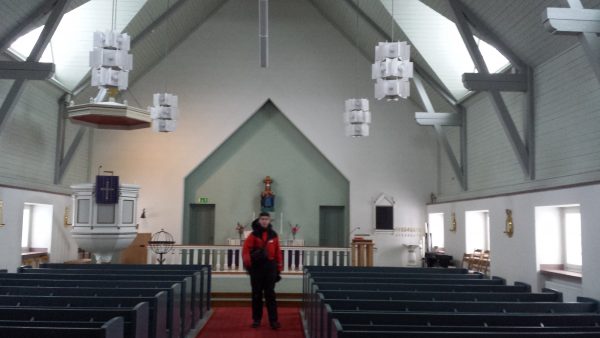
I started thinking like this when on holiday for a few days. We were delving well within the Arctic Circle. The Swedish village we stayed in (Karesuando) had a lovely church (pictured here). So the locals have a viable venue for a wedding (as long as they want a religious ceremony).
But when would be a good time and how would you organise the reception? The main thing to consider would surely be the weather. In February, the time of our visit, the temperature would typically descend to minus 15, and, of course, there was sure to be a metre or more of snow on the ground.
If you choose the summer, there is plenty of daylight. However, we learned that mosquitoes are a major problem. (I mean ‘major’ – apparently, you can’t go out without full netting.)
So when would be the best season for your big day?
There are an issue or two to surmount in Lapland.
Most people, who dwell in less severe climes, have other obstacles to overcome. (Not to overlook the fact that for an outdoor wedding in, say, the UK, the weather issue remains very much to the fore).
For some, the obstacles may be a matter of convenience: can the ceremony and reception be held at the same venue? For others, the primary concern will be balancing the budget. For others again, it may be a question of “Whom do we invite – and whom do we leave out?”
Of course, there’s no definitive answer to any of these, as each will depend on the couple and particular circumstances. I would advise devoting plenty of time, once the budget has been set, to the guest list. (I genuinely forgot to include an elderly aunt at my own wedding, and the fall-out was not insignificant!)
Then there’s the ceremony itself. Will it be conventional or, maybe, unique? Who is going to make the final decision here – the couple or the families?
Is it going to be church?
Is it going to be part-religious – so you can have a civil celebrant conducting a personalised ceremony for you, once the registrars have done the legal bit?
Or perhaps you’ll marry legally at a Register Office, and then hold the ceremony of your dreams in the venue of your dreams. To all intents and purposes, this will be your actual wedding. Again, your civil celebrant will be able to offer you ideas and guidance.
Usually, wedding obstacles are not insurmountable. Often, advice and compromise are sufficient. I’ve helped out quite a number of couples now with mixed-faith issues.
Can I help you too?
by Michael | Jul 24, 2017 | Blog
I am being asked more and more often about naming ceremonies and what they consist of, so I thought a blog answering that question might be in order.
Why a Naming ceremony?
A few common reasons for arranging a civil ceremony are:
- Religious elements are wanted, but the couple are mixed-faith
- The couple want to mark the rite of passage, but preferably not (or barely) religiously
- A couple are marrying, and bringing a child or children into the relationship. They want to formally symbolise their integration into one family.
What does a Naming ceremony consist of?
Because I specialise in bespoke ceremonies, I can’t give a one-size-suits-all answer. As we have already seen, these ceremonies may be religious or secular, and can be held indoors or out. Thus rituals will be more or less appropriate depending on the circumstances and tone.
Participation
Naming ceremonies tend to be more relaxed (although some of the content may be quite serious), and there’s usually a greater element of participation than with many other ceremonies.
Here, the parents may want to take an active role. They may choose and read poems (of course, the celebrant can help them with choices). They may also read out promises to the child. Again, they write these themselves or use a bit of help.
Godparents and/or grandparents may be invited to play a role. They may read a text about what it means to be a god/grandparent, for example.
Ritual
As well as music, which is another option to be considered, you could include some rituals. Unity candle lighting is deservedly popular. This doesn’t always work outdoors (for obvious reasons!), and health and safety does have to be taken into account inside! But it’s especially good if two families (with children) are combining.
Another possibility for a baby, is to sprinkle her with rose petals (different colours representing desired qualities). Again, this invites participation.
The ceremony might end with a communal blessing and a baby-specific blessing (not necessarily religious).
I hope this gives a flavour of the “typical” ceremony, and will whet a few appetites! I’ll be very happy to help out, if you want to know more.
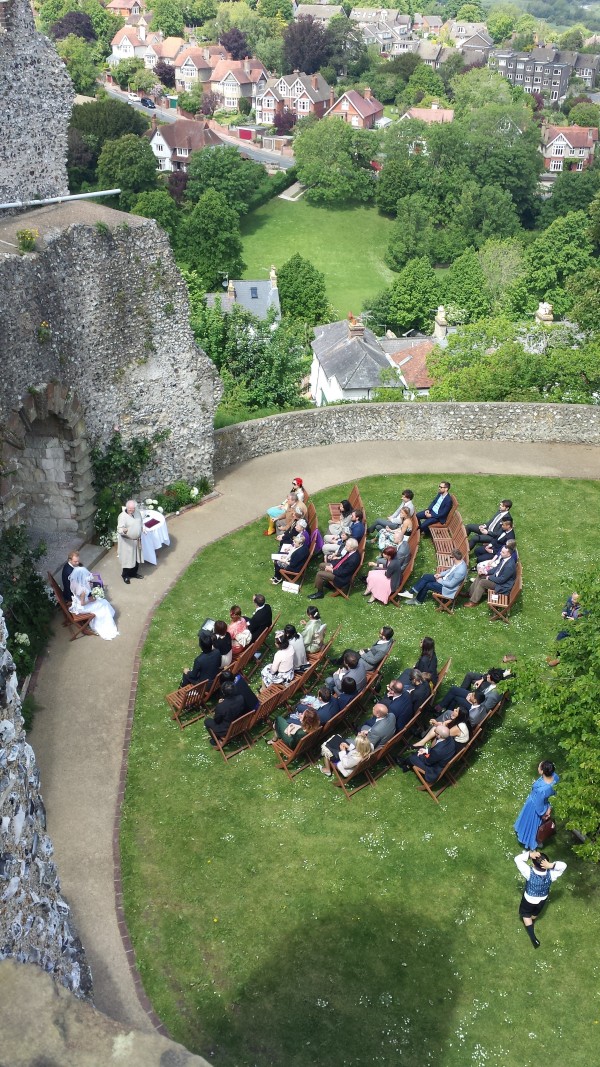
by Michael | Jul 10, 2017 | Blog
Getting a few things straight
Don’t assume the ideal venue for your big event is just there for the taking. For a start, it may not be available on the day. And it might cost more than you anticipate.
So you may only be able to approximate to “ideal”. Probably before anything else, you’ll need to look at your budget.
I can’t sort your finances out for you. You may well want a castle or The Ritz, but they won’t come cheap. You may have to give up on a dream. (There may find wonderful substitutes, though, once you’ve done some research.)
So this article assumes that you accept budgetary limitations.
Ceremony and/or Reception
The other thing to get straight, from the start, is where you actually hold your wedding (or other) ceremony.
You may go from the church (say) to another venue (like a hotel) for the reception.
A lot of people prefer to keep the travel arrangements simple, or prefer a secular (or only part-religious) service. Licensed premises (licensed for weddings!) will tick both boxes. You can arrange for registrars to come and do the legal bits, and then glide seamlessly through to the next part. (That could be a civil celebrant- led personalised ceremony and/or canapes and drinks etc.)
Old Sarum is a wonderful setting for a handfasting!The third possibility is potentially most exciting. You can have the ceremony exactly where you want it (your imagination can run riot!), provided you get permission, of course. So you go (by appointment) to your local Register Office with two witnesses and get legally married. Any time after that, you go up your mountain, visit Stonehenge, mooch by your favourite canal, come into your parents’ back garden, or wherever, with your civil celebrant, and have the ceremony of your dreams.
Naturally, unless you hold this in a restaurant or hotel, you will still have to consider catering.
Choosing your Venue
Depending on your choices above, my venue suggestions would be based on personal recommendation, websites and Google to help you narrow down your search. Then, with your partner, arrange a visit, making sure you get shown round by the event planner.
Go and see a couple of possible of venues, and bear in mind that different weather conditions on the day(s) may unfairly influence your choice!
What you need to find out
Bring a list of questions with you, and write down the answers, in case you forget them later when you’re comparing notes. Naturally, you want to know the cost, but also check exactly what you get, and do not get, for the price. You may have certain requirements (eg “Can I bring in a florist from outside?” or “Can you arrange kosher catering?”) – don’t be afraid to ask.
Parking, catering, decoration, disabled access, bar, toilets, PA system, signage, choice of rooms, setting up the entertainment, buffet or silver service are all issues you are likely to need to discuss. Will the wedding planner (or deputy) be available on the day itself? How much deposit is required, and when must the balance be settled?
If the planner seems adaptable and genuinely willing to put herself out, then that looks good. Do you like her, and would you feel confident working with her?
What is also paramount is your feel for the place. Does it excite you? Do you really want to go there? If you’re lukewarm about the venue, then maybe you should look elsewhere.
If all this sounds like a lot to take in and get done, then bear in mind that you should be starting this process at least a year before the big day. Also consider that this is potentially the biggest day in your lives, and the venue can make or break it. It’s not a choice to be made lightly.
I’m always willing to help and advise, so do have a chat with me about any of the issues this article may have raised.
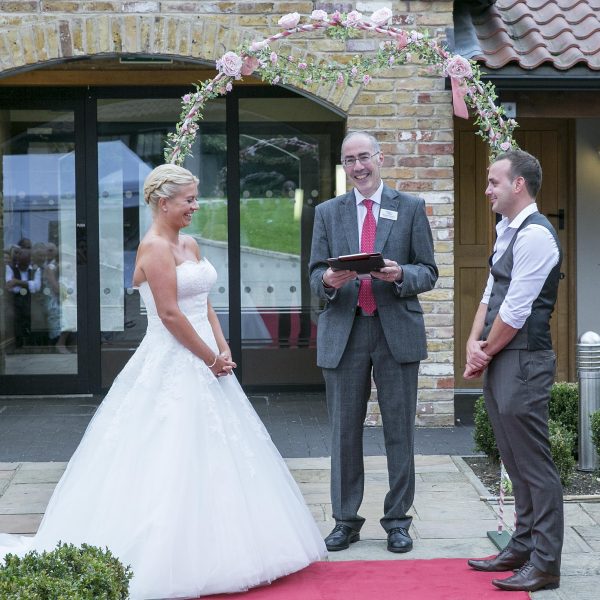
by Michael | Jun 20, 2017 | Blog
Your wedding ceremony should be the most important day of your life. Of course, you want to get it right. But what does it mean, to “get it right”?
There’s a lot of choices out there – possibly, more than you realise.
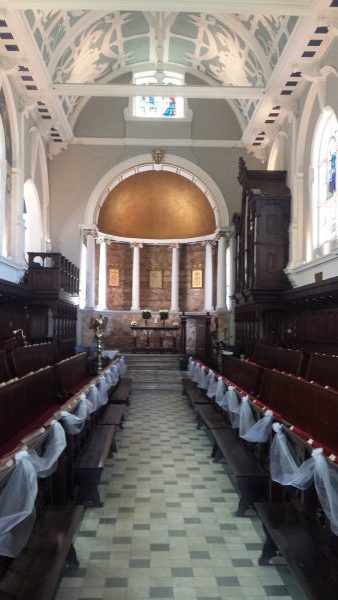
Religious, or not?
In many cases, the first decision you make together is whether or not you want a full religious ceremony. If not, do you want the other extreme? Of course, you can have a fully secular one, but maybe you prefer a mixture?
Anglican
If your choice is a Church of England ceremony, it’s easier if it’s your local church, but you can choose another one. Normally, the Vicar will be able to take you through everything. There’s no need to visit a Register Office either, as everything can be done in one ceremony. The cost of this starts at £456.
Church of Scotland
Church of Scotland ceremonies can take place anywhere and at any time (as long as your minister is in agreement). You don’t need to be a Scottish resident – but you do need to give between 15 days and three months’ notice at the Register Office.
Roman Catholic
You’ll need to take your baptism and confirmation certificates along to your priest at least six months before you wish to marry. If one of you hasn’t been baptised, your priest’s permission will be needed. You’ll be expected to attend marriage preparation classes, and to attend Mass for six weeks before your wedding day. Additionally, you need to go to your local Register Office to give notice and obtain your marriage licence.
Jewish
You will need to apply to the religious authorities and to the local Register Office. A religious ceremony will normally take place in a synagogue, but the rabbi may agree to conduct it elsewhere.
Secular
If you’re certain you want no religion, then you can opt for a humanist wedding. This will not be recognised in law, so you will still need to attend a Register Office ceremony beforehand. You can hold the humanist wedding wherever you wish, and can write your own vows and hire a humanist celebrant.
Just remember, that in a humanist ceremony, there should be no mention at all of God or even religious references, so if that’s a bit too extreme, you may want to consider a civil ceremony.
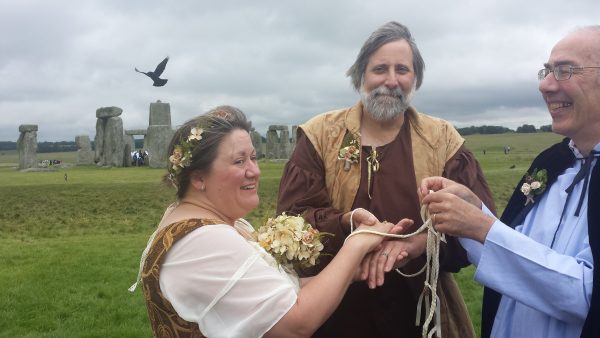 Civil Ceremony
Civil Ceremony
Like the humanist wedding, a civil wedding has no legal validity. It is simply a ceremony that is put together specially, usually by a professional civil celebrant. It should create a fabulous atmosphere and may well reflect the personalities and beliefs of the couple.
You can hold this wherever you like. If it’s in a property licensed for marriages, the registrars can be booked to come out (at an extra charge) and conduct the legal ceremony there. The civil ceremony can follow on straight afterwards. Otherwise, if not in licensed premises, you both need to go to the Register Office beforehand, with two witnesses. (This costs £35.)
Register Office
In addition to the celebrant charge, you will have to pay the registrars for the legal words to be pronounced. To organise this in the first case, go to the local Register Office to give notice. (If you’re not marrying locally, you’ll have to contact that particular Register Office to ensure they have somebody available on your chosen day.)
You’ll need ID, proof of address and nationality, any previous marriage documents and details of your venue. Once issued, the notice will be displayed for 15 days before you can legally marry. Your marriage licence is valid for a year.
You can find your civil celebrant via recommendation, Google – or at this website!
So I hope you see that there are other routes open to you than full religious or humanist. As long as the legal words are said and witnessed properly, everything else can be as original and personalised as you choose. You really can have the day of your dreams!
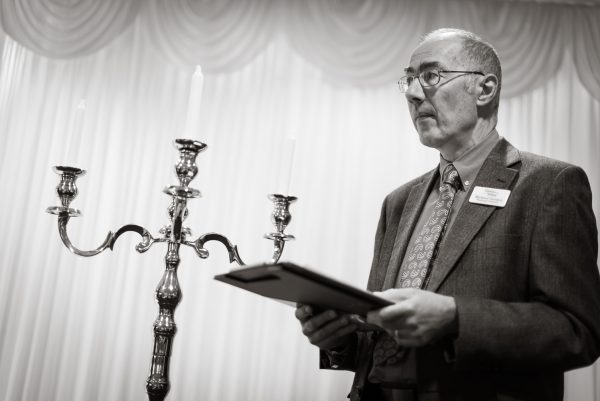
by Michael | Jun 13, 2017 | Blog
“I don’t mean to be rude, but do we actually need civil ceremonies?” The question emerged over networking when a lady I had just met found out what I did for a job.
No offence was intended, or taken. And, to some extent, she had a point.
A religious society
After all, over 50% of the UK population consider themselves Christian (according to recent research). So why would they need civil ceremonies at all? A little over 25% professed no religion. So they’ve got the option of a secular ceremony at the register office. OK, that leaves some people out, but it does cover most people.
But hold on a moment!
Religious objections
Not everyone who claims to be “religious” wants a full, standard religious ceremony, do they?
And what do you do, if you do want a religious ceremony, but are marrying someone of a different faith? Church isn’t an option, if you are Catholic and divorced. What if your church won’t accept you because you’re gay? And what if a religious service doesn’t really rock your boat, but do want a blessing or a prayer (mainly to keep parents happy, say)?
The secular option
In all those cases, when the Church won’t provide what you want, you have to turn to the Register Office. There they will read out the standard, necessary words to make your marriage legal. But, unfortunately, the ceremony must be totally secular (and impersonal). It can be a bit of a conveyor-belt operation.
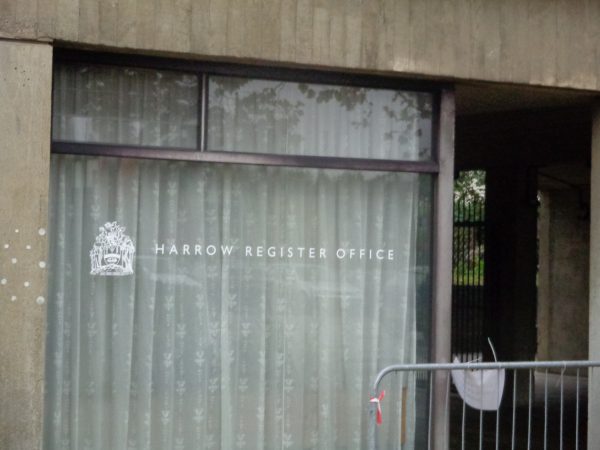
In surroundings that may not be much to write home about!
So, I hear you ask, is there another option?
A real choice
Indeed. As I explained to the lady, that is where a civil celebrant comes into his or her own.
The assets of a civil celebrant are that they build a ceremony from scratch. A good celebrant takes the time to work with the clients to offer ideas and also guidance about what is possible and might work. He will ask questions (and supply answers too), so that he can build up a full picture of what the couple wants. He will then write or compile a ceremony that reflects their personalities and beliefs, and is everything they want it to be.
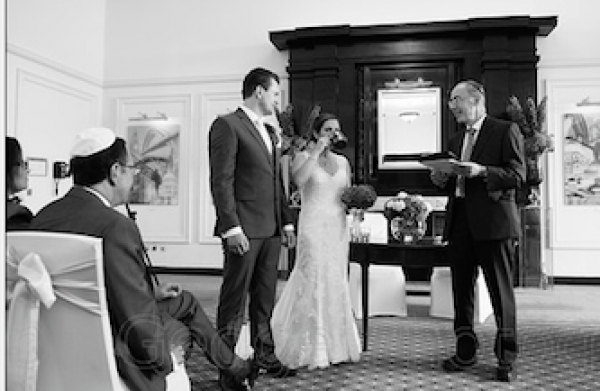
Photo courtesy of Philippa Gedge
Not only will the ceremony be personalised and unique but it will tick the other box: it can be as religious as the couple want it to be.
It should be pointed out that civil celebrants are not (yet) licensed to conduct legal marriages, so the registrar ceremony is still compulsory. However, once the legal formalities are over, you can enjoy a fabulous meaningful ceremony that will be memorable for all the right reasons!
I believe, after our conversation, that that lady understood my role a bit better – and didn’t regret her question too much!
Of course, if any reader wants to follow up with me, I’d be delighted to explain more. Please feel free!






 Civil Ceremony
Civil Ceremony

